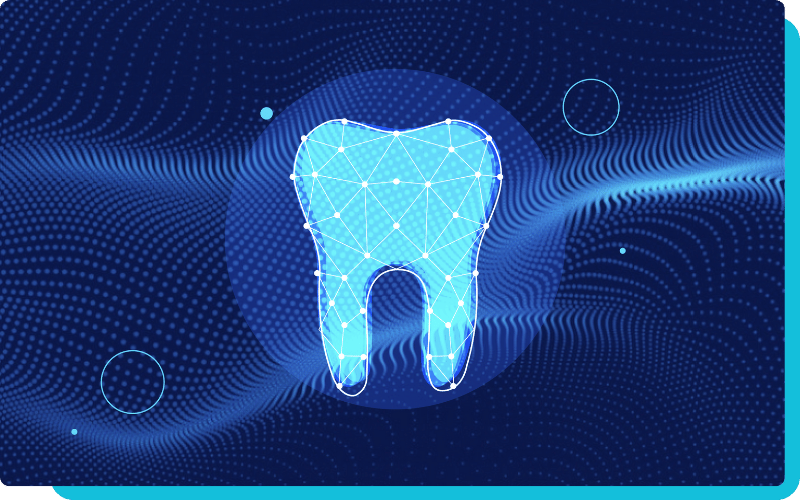How AI is poised to become dentistry's newest, most powerful tool yet

Over the last few years, artificial intelligence (AI) has become a mainstay in popular discourse. We dental professionals tend to meet the distant promise of robot dentists with a mixture of fear and amusement. But there’s a much nearer term AI reality for dentistry, one that doesn’t involve android implant surgeons. Indeed, AI technology in various forms is already upon us, and it’s poised to reshape dentistry in wonderful ways.
- AI in medicine: The power of AI to recognize patterns is already being harnessed to identify abnormalities in brain, heart, and lung scans faster than trained radiologists.
- AI in patient interactions: Patients trust unbiased computer analysis, making the "second opinion" of AI identification a valuable tool when explaining x-ray findings.
- AI in business: AI pattern recognition can also be applied to practice-wide data sets, helping owners make informed purchasing decisions.
The edge of tomorrow
While it is a good time to be a dentist due to job growth and median income, major challenges still remain. For one, people don’t always trust dentists, which contributes to 89% of us working in fear of being sued. More than half of us refer to specialists to avoid that threat. We can’t afford to lose that business. We respond by seeing more patients, which puts a strain on our ability to perform our duties well.
Soon, however, AI software will begin to help dentists work faster, smarter, and more accurately. The dentists who embrace technology will make significant steps toward addressing the challenges facing our profession.
The real benefits of AI
Most AI deploys some combination of computer vision (the processing and understanding of digital imagery), machine learning (data-driven algorithms that enable computers to learn underlying patterns about the data they process), and predictive analytics (statistical modeling used to find or forecast patterns and outcomes).
Medicine is already applying AI in hospitals, where it identifies abnormalities in brain, heart, and lung scans. In 2011, researchers from New York University Langone Health found that computer vision could find and match specific lung nodules on chest scans 62% to 97% faster than a panel of radiologists.
Computer vision applied to dental imagery will be able to scan and annotate x-rays, identifying dozens of pathologies like tooth decay and bone loss, as well as past dental work and natural anatomy. Natural language processing and predictive analytics will scan patient histories and medical records to find trends, predict progressions, and chart treatment plans. Taken together, this kind of software will have a dramatic impact on dental office operations.
Patient care
People may not trust their dentists, but they do trust computers—and for good reason. AI can identify caries and other dental pathologies faster, earlier, and more accurately than a human dentist.
An AI “second opinion” will be particularly valuable for dentists in solo practices. It will help us avoid diagnostic mistakes while making patient education easier. With an AI-backed report justifying our diagnoses, we’ll be able to focus on clearly communicating treatment plans with compassion and empathy.
AI-powered predictive analytic technology will then be able to analyze unstructured data within a patient’s medical record and tie it back to more massive datasets to discover other health concerns. This plays into the trend toward an integrative practice methodology that will give dentists the chance to take a more significant role in their patient’s overall health.
Business operations
When you’re seeing 20 patients a day, speed is key. In addition to giving us more time for patient interaction, AI will provide more bandwidth for planning, managing staff, and evaluating new equipment.
Predictive analytics within any data management platform can also yield business insights. The same trends that inform patient care, such as diagnoses, treatment plans, and related health concerns, can inform other decisions.
The larger the practice or network, the more data there is to work with, so the better the insights will be. When CEOs of large networks see a large percentage of patients with bone loss, they may consider buying that $50,000 dental laser. Likewise, a solo practitioner who sees a similar trend might strike a deal with a specialist who already owns the equipment.
Talent development
Dental colleges like Penn Dental Medicine and the Columbia School of Dentistry are at the forefront of advanced instructional technologies, like electronic learning and gamification, which deliver a new generation of tech-savvy docs.
At the University of Pennsylvania, students use gloves enabled with haptic sensors that simulate touch to practice pulling teeth or performing surgery. Likewise, gamification schemes aid learning and hybrid lesson plans that incorporate video and e-learning with traditional classroom studies are helping train new dentists.
Once dental students enter the job market, AI can be used to evaluate potential hires, vetting them against not only the AI but also against their more established peers. This capability will be particularly helpful for large networks that more often hire new grads.
Public health
When thousands of private practices engage with applications that feed large data sets, the benefits to public health can be substantial. AI will allow researchers to crunch data sets to find correlations between symptoms that indicate the need for further study, trends within subpopulations, and more. When a dentist puts x-rays and patient files into an AI system, it will be able to link any abnormalities it finds to related health concerns.
What’s next?
AI promises many things, including economic growth, efficiency, and life-changing technologies. Now it is ready to revolutionize dentistry. By embracing the incremental efficiencies that AI offers—faster diagnosis, auto-charting, predictive analytics—we will start together down a long road that promises so much more.
Dentists who incorporate these new technologies will become more accurate, profitable, and trusted by patients. Holistic health care, improved access to dentistry, and better quality of life for dentists themselves are all in our future, and we’ll have AI to thank.